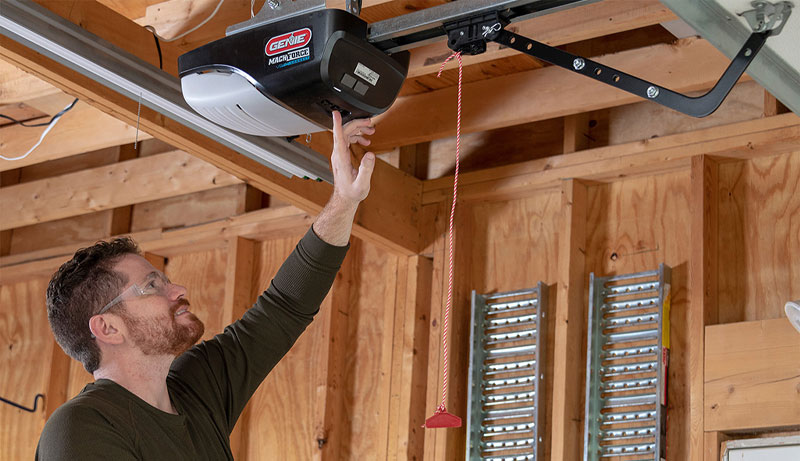Welcome to the modern realm of garage door openers! Picture this: after a long day at work, as you approach your garage door, it gracefully swings open. No need to step out of your car; you simply drive right in, and like magic, the door closes automatically behind you. That level of convenience is something we all cherish, isn’t it? But have you ever wondered about the electrical demands of a garage door opener?
The power consumption of garage door openers isn’t uniform across the board. It hinges on the specific model and type of opener you have. Nevertheless, in most cases, these devices typically draw anywhere from 2 to 5 amps of power at 120 volts when they are at rest, and about 12 amps when they are actively operating. Of course, this can vary depending on the particular specifications of your opener.
It’s not a topic that usually crosses our minds, but understanding the amperage requirements of your garage door opener can be quite significant. In this blog post, I’ve compiled all the essential information you need regarding the power usage of garage door openers.
You can anticipate discovering details such as their electricity consumption, the recommended breaker size, maintenance tips, and much more. As always, let’s commence with a brief overview.
How Do Garage Door Openers Operate?
Garage door openers function by employing a complex system of springs, pulleys, and cables to smoothly open and close your garage door. The opener unit itself is affixed to the ceiling of your garage and comprises a motor, chain, belt, or screw responsible for driving the mechanism.
When you press the button on your garage door opener remote, it dispatches a signal to the opener unit. Subsequently, the opener unit springs into action, activating the motor which, in turn, sets the chain or belt in motion. This mechanical dance results in the graceful opening or closing of your garage door.
The chain or belt is intricately linked to a series of pulleys that are strategically mounted on the tracks of your garage door. As the chain or belt moves, so do the pulleys. This synchronized movement artfully guides the garage door along its tracks, ushering it into its desired position.
How Many Watts Does a Garage Door Opener Consume?
A typical garage door opener consumes approximately 350 to 600 watts of power, with an average wattage of around 500 watts during idle periods. However, when the lights are active, and the door is in operation, the wattage requirements may vary depending on the specific garage door opener and lighting system in use.
Similar to other appliances, wattage ratings can differ between various garage door opener models. Typically, the power demand remains below 600 watts while the unit is at rest. Yet, when the control board initiates the door’s movement, the wattage can surge to as high as 1,400 watts before stabilizing between 550 and 725 watts while the door is in motion. The exact energy requirements hinge on the type of garage door you have.
Notably, this assessment does not include the impact of lighting. If you use energy-efficient LEDs, they are unlikely to significantly affect the overall power consumption.
How Many Amps Does My Garage Door Opener Utilize?
The amperage drawn by your garage door opener corresponds to its wattage. Based on the average idle wattage range of 350 to 600 watts, you can expect your garage door opener to draw approximately 2.92 to 5 amps, with an average of around 4.17 amps at 120 volts.
Compared to many other household appliances, a garage door opener is not particularly power-hungry. Nevertheless, knowing the precise amperage is valuable for electrical configuration purposes. On average, a garage door opener requires roughly 4.17 amps, still well within the 5-amp range, but this can spike to around 12 amps during door operation. The specific amperage will ultimately depend on the make and model of your garage door opener.
Does a Garage Door Opener Require a Dedicated Circuit Breaker?
While a garage door opener does not necessarily demand a dedicated circuit breaker, it is advisable to have one. A dedicated circuit breaker offers numerous benefits, including enhanced convenience and heightened garage security.
Garage door openers are not power-intensive appliances, so there is minimal risk of overloading your circuits. However, having a dedicated circuit breaker for your garage door opener remains a prudent choice.

A dedicated circuit breaker serves two primary purposes. Firstly, it allows you to easily deactivate your garage circuit whenever you leave home, enhancing security by preventing unauthorized access to your garage, whether from outside or remotely.
Secondly, a dedicated circuit breaker simplifies troubleshooting in case of any circuit-related issues. If you encounter problems with your garage door opener, having a dedicated circuit breaker will expedite the process of identifying and resolving the underlying electrical concerns.
In summary, while a garage door opener does not necessarily require a dedicated circuit breaker, the advantages it brings in terms of convenience and security make it a worthwhile addition to your garage’s electrical setup.
What Size Breaker Should You Use for Your Garage Door Opener?
Your garage door opener should be connected to a 120-volt 20-amp circuit breaker, in line with the 2017 revision of the National Electrical Code (NEC). You might wonder if a 15-amp breaker would suffice for your garage door opener. Technically, it could, as garage door openers don’t consume as much power as some other household appliances. In fact, 15-amp breakers were commonly used in garages before the updated code came into effect.
However, we recommend opting for the 20-amp breaker to err on the side of caution. The larger breaker size is safer and more convenient, especially if you have multiple garage door openers sharing the same circuit. A 20-amp breaker can accommodate the simultaneous operation of three or four garage doors. You can even wire more doors to the same circuit as long as they don’t all attempt to open at once.
Regarding the lighting in your garage, it’s advisable to have it on a separate circuit from the garage door opener for optimal electrical distribution.
What Are Ground-Fault Circuit-Interrupters (GFCI) and Should You Use Them in Your Garage?
A Ground-Fault Circuit Interrupter (GFCI) is an outlet equipped with a built-in circuit breaker designed to safeguard against electrical shocks by cutting off power when it detects a current leak.
While GFCIs are commonly found in areas prone to water exposure, such as kitchens, bathrooms, and laundry rooms, installing GFCI protection in your garage is a prudent choice. Despite the outlets in your garage typically being located 8 to 12 feet above the ground, they are interconnected with other garage outlets. Therefore, in the event of a current leak, the GFCI will promptly deactivate the power, preventing potential electrical shocks.
In summary, while GFCI outlets in your garage may not be mandatory, it’s still advisable to install them for added safety. Always seek the assistance of a qualified electrician for installation, as this is a critical component of your electrical system that should not be mishandled.
Is a Battery Backup Necessary for Your Garage Door Opener?
Indeed, installing a battery backup for your garage door opener is essential. A battery backup ensures that your garage door opener continues to function even during power outages. It enables you to enjoy the convenience and security of a garage door opener without the risk of being stranded outside your garage.

In some states, like California, the installation of a battery backup for garage door openers is now legally required. A bill, B969, passed in the fall of 2018 mandates that all new garage door openers manufactured, sold, or replaced after July 1, 2019, must include a battery backup system. Failure to comply with this requirement may result in a penalty of $1000.
In areas prone to extended power outages, a battery backup not only facilitates garage access but also allows remote operation of your garage door opener, enhancing overall convenience and security.
Understanding Garage Door Opener Amperage
A garage door opener is an electrical device that operates your garage door, allowing it to open and close with minimal effort. Like most electrical appliances, garage door openers have specific power requirements, which are measured in amps (amperes). Amperage represents the amount of electrical current flowing through a circuit.
The amperage draw of a garage door opener can vary depending on several factors, including the model, type, and brand. However, there are general guidelines that can help you understand the typical amperage requirements.
Idle Amperage:
When your garage door opener is in its idle state, i.e., not actively opening or closing the door, it typically draws between 2 to 5 amps of power at 120 volts. This is a relatively low power consumption and can be compared to that of other small household appliances.
Operating Amperage:
The amperage usage increases significantly when the garage door opener is in operation. During the process of opening or closing the garage door, it can consume approximately 12 amps of power. This surge in amperage is temporary and occurs only while the motor is actively engaged in moving the door.
It’s important to note that the exact amperage requirements can vary from one garage door opener to another. Factors such as the opener’s motor size, design, and features can influence its power consumption. Therefore, it’s advisable to consult the manufacturer’s documentation or labeling on your specific garage door opener to determine its precise amperage ratings.
Frequently Asked Questions (FAQs)
1. How Much Does Garage Door Opener Installation Cost?
The cost of installing a garage door opener can vary depending on factors like location and the professional you hire. On average, you can anticipate spending between $120 and $550 for professional installation. The installation process typically takes around 2 to 6 hours, with an average hourly rate ranging from $60 to $85. As for the unit itself, prices can range from $200 to $550, contingent on the model and its features.
2. What Are the Costs Associated with Maintaining a Garage Door Opener?
Maintaining a garage door opener usually incurs a labor cost of approximately $130. In cases where the opener requires repairs, the expense may be around $300, depending on the nature of the issue. Maintenance tasks often involve tightening hardware, lubricating chains, or greasing rails, depending on the type of garage door you have. If you possess the necessary tools and knowledge, you can undertake these maintenance tasks yourself.
3. What Is the Typical Lifespan of a Garage Door Opener?
The average lifespan of a garage door opener is approximately 10 to 15 years. However, with regular and proper maintenance, it has the potential to last even longer. In fact, if you exercise caution in its use and consistently perform maintenance, your garage door opener can endure for 20 years or more.
4. Do all garage door openers have the same amperage requirements?
No, the amperage draw of garage door openers can vary depending on the model and make. It’s essential to check the specifications of your specific opener to determine its exact amperage requirements.
5. Why is it important to know the amperage of my garage door opener?
Knowing the amperage of your garage door opener is crucial for electrical configuration and understanding its power demands. It helps ensure that your electrical system can accommodate the opener and any other devices on the same circuit without overloading.
6. Can I use the same circuit for multiple garage door openers?
Yes, you can use the same circuit for multiple garage door openers as long as the total amperage draw of all openers does not exceed the circuit’s capacity. However, it’s essential to ensure that they do not all attempt to operate simultaneously to prevent overloading the circuit.
7. How can I find the amperage rating of my specific garage door opener?
To find the amperage rating of your garage door opener, refer to the manufacturer’s manual or label on the unit itself. The amperage rating is typically provided in the technical specifications section or on a nameplate located on the opener.
Final Thoughts
A car garage door opener is a valuable convenience to have in your home, providing safety, security, and enhanced convenience. Unlike certain home appliances, it doesn’t significantly impact your power bill due to its relatively low power consumption. So, while it relies on electrical energy to function, it remains an efficient and cost-effective addition to your household.





Leave a Reply